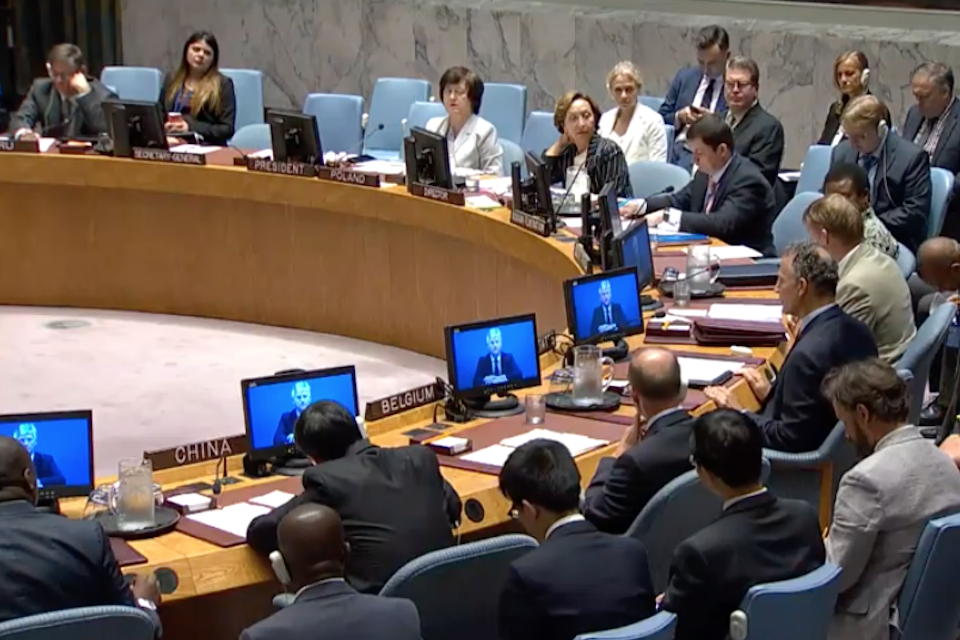Transitioning to a peaceful, democratic and prosperous future in Sudan
Statement by Ambassador Jonathan Allen, UK Deputy Permanent Representative to the UN, at the Security Council briefing on UNAMID.

Well, thank you, Madam President, and thank you to our briefers as well.
Madam President, this is a very positive moment and therefore, I hope a very positive meeting of this Council. The people of Sudan have brought about unprecedented change through their demands for a peaceful, democratic and prosperous future. And I congratulate, of course, not only the people of Sudan, but also the African Union and the government of Ethiopia for their mediation efforts. The Council has welcomed those recent events in a press statement. I just reiterate today the United Kingdom’s support for the Sovereign Council and its appointment of Dr. Abdallah Hamdok as Prime Minister.
The 17 August agreement contains a number of important commitments: a pledge to respect human rights and fundamental freedoms, and a commitment to accountability and justice, including a commitment to establish a national independent committee to investigate the violent acts committed on the 3 June and other incidents of human rights violations and abuses. We welcome very much these commitments made by Sudan and encourage all those with a stake in Sudan’s future to ensure the timely and full implementation of the agreement in order to make the demands of the Sudanese people a reality. The United Kingdom will, of course, support the new prime minister, the new government, as as best that we can.
Madam President, for decades, Sudan has been plagued by internal conflict. But with the beginning of a new chapter in Sudan’s history, we – and more importantly, the people of Darfur – can begin to feel a sense of hope and optimism. The new government has committed to achieve a fair, comprehensive and sustainable peace in Sudan and prioritize the peace process, which we very much welcome. We call on all sides but in particular the armed movements to engage constructively, immediately and without preconditions in negotiations to finally deliver a peaceful solution to the conflict in Darfur.
Remaining on Dafur for a moment, Madam President, I would just note that the United Kingdom remains one of the largest humanitarian donors; over $100 million were given by the United Kingdom last year for humanitarian assistance. And there have been many humanitarian implications of the conflict in Darfur. So as the new government works to deliver peace, may I also request them to take immediate steps to help address the humanitarian situation? In particular, one very concrete step that could be taken would be to ensure full access for those seeking to provide support through the removal of bureaucratic impediments imposed by the previous government on humanitarian access. I hope that’s something that Sudan will be able to move quickly on.
Madam President, the uncertainty in Sudan during the mandate renewal led, as we all know, to a pause in the transition from peacekeeping to peace building. When this Council adopted Resolution 2479, I said then that there needed to be meaningful progress on a number of fronts before the transition could resume. Now, the transition to a civilian-led government has clearly been agreed and it is extremely welcome. We believe that there is a legitimate partner for the United Nations and the African Union to engage with on UNAMID’s drawdown and that transition to peacebuilding.
And I’d like to thank Jean-Pierre Lacroix for some of his updates on some of the wider issues. But he talked of some reassurances given. I’d just like to ask Under-Secretary-General Lacroix, whether at this stage the rapid support forces have withdrawn from the former UNAMID team site so they can be used for civilian purposes? Or whether this is instead something that is under discussion? It would be helpful to know what the status of those former team sites are.
Madam President, in addition to genuine, sustained commitment from the new government and the armed movements, clearly, continued international efforts will be required in support of the new government in tackling the underlying causes of the conflict. May I say here, it’s good to hear about the joint visit here proposed by Under-Secretary-General Lacroix and Commissioner Chergui and indeed the suggestion that there might be further spotlight on this issue during High Level Week.
So we will need to see, for example, a need for political support to the peace process, including implementation and monitoring of future peace agreements, clearly continued human rights monitoring, will be required. Capacity building will be required and there will be a need for humanitarian development support, particularly for Darfur’s almost 2 million internally displaced persons. This support may be best provided through a continued UN/AU presence in Darfur after UNAMID’s closure. In this regard, we look forward to the AU and the UN providing the Council with options for a follow-on mechanism to UNAMID in the upcoming special report at the end of September. These options should be comprehensive and build on the opportunity that this moment in Sudan’s history represents.
Let me conclude, Madam President, by again welcoming the positive developments underway in Sudan, commending again the people of Sudan for the incredible transformation that they have undertaken, and to say that after decades of conflict, poor governance, human rights abuses and economic mismanagement, the new government has not only a momentous opportunity, but a momentous task ahead of them. And the United Kingdom stands ready to work with the new government, with the people of Sudan, as they seek that transition to a peaceful, democratic and prosperous future.
Thank you, Madam President.